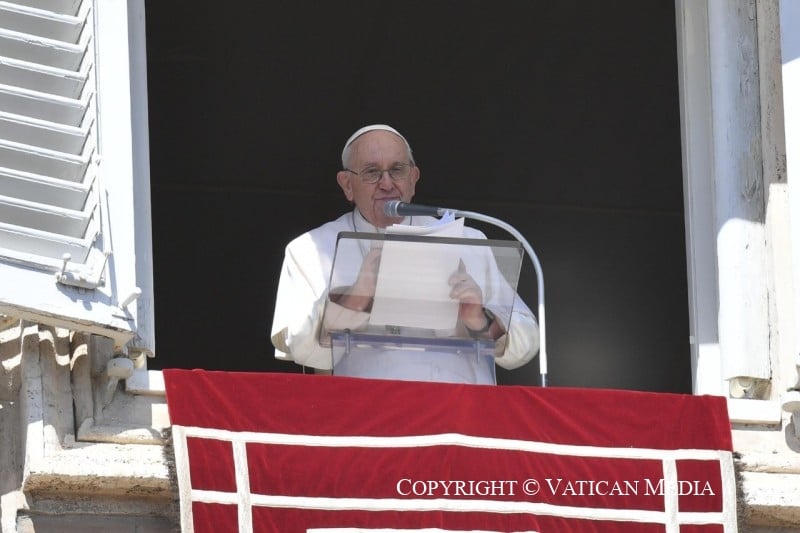“The thirst of Jesus is not only physical: it is above all a thirst for our love”
The Pope's words at the recitation of the Angelus

At 12 noon today, the Holy Father Francis looked out of the studio window in the Vatican Apostolic Palace to recite the Angelus with the faithful and pilgrims gathered in St Peter’s Square.
These were the Pope’s words in introducing the Marian prayer:
Before the Angelus
Dear brothers and sisters, buongiorno, good Sunday!
This Sunday, the Gospel presents us one of the most beautiful and fascinating encounters Jesus has – the one with the Samaritan woman (cf. Jn 4:5-42). Jesus and his disciples take a break near a well in Samaria. A woman arrives and Jesus says to her, “Give me a drink” (v. 8). I would like to pause specifically on this expression: Give me a drink.
This scene depicts Jesus, thirsty and tired. A Samaritan woman finds him at the hottest hour, at midday, asking for refreshment like a beggar. It is an image of God’s abasement. God lowers himself in Jesus Christ for our redemption. He comes to us. In Jesus, God made himself one of us, he lowered himself. Thirsty like us, he suffers our same thirst. Thinking about this scene, each one of us can say: the Lord, the Teacher, “asks me for a drink. So, he is thirsty like me. He shares my thirst. You are truly near me, Lord! You are in touch with my poverty.” But I can’t believe it! “You have grasped me from below, from the lowest part of myself, where no one reaches me” (P. Mazzolari, La Samaritana, Bologna 2022, 55-56). And you have come to me from below and you have grasped me from below because you were thirsting and thirst for me. In fact, Jesus’ thirst is not only physical. It expresses the deepest thirsts of our lives, and above all, a thirst for our love. He is more than a beggar. He “is thirsty” for our love. And this will emerge at the culminating moment of his passion, on the cross, where, before dying, Jesus will say: “I thirst” (Jn 19:28). That thirst for love brought him to descend, to lower himself, to abase himself, to be one of us.
But the Lord who asks for a drink is the One who gives to drink. Meeting the Samaritan woman, he speaks to her about the Holy Spirit’s living water. And from the cross, blood and water flow from his pierced side (cf. Jn 19:34). Thirsty for love, Jesus quenches our thirst with love. And he does with us what he did with the Samaritan woman – he comes to meet us in our daily life, he shares our thirst, he promises us living water that makes eternal life well up within us.
Give me a drink. There is a second aspect. These words are not only a request from Jesus to the Samaritan woman, but a cry – silent at times – that meets us every day and asks us to slake someone else’s thirst, to take care of someone else’s thirst. How many say ‘give me a drink’ to us – in our family, at work, in other places we find ourselves. They thirst for closeness, for attention, for a listening ear. People say it who thirst for the Word of God and need to find an oasis in the Church where they can drink. Give me a drink is a cry heard in our society, where the frenetic pace, the rush to consume, and especially indifference, that culture of indifference, generate aridity and interior emptiness. And – let us not forget this – ‘give me a drink’ is the cry of many brothers and sisters who lack the water to live, while our common home continues to be polluted and defaced. Exhausted and parched, she too “is thirsty”.
Before these challenges, today’s Gospel offers living water to every one of us who can become a refreshing spring for others. And so, like the Samaritan woman who leaves her jug at the well and went to call the people of her village (cf. v. 28), we too will no longer only think of slaking our own thirst, our material thirst, our intellectual or cultural thirst, but with the joy of having met the Lord, we will quench others’ thirst, giving meaning to someone else’s life, not as masters, but as servants of that Word of God who has thirsted for us, who continually thirsts for us. We will understand their thirst and share the love he has given to us. A question to ask myself and all of you is coming to: Are we able to understand the thirst of others, the thirst people have, the thirst so many in my family, in my neighbourhood have? Today, we can ask ourselves: Do I thirst for God? Am I aware that I need his love like water to live? And then: I who am thirsty, am I concerned about the thirst of others, their spiritual thirst, their material thirst?
May Our Lady intercede for us and sustain us on the way.
Related

Funeral of Pope Francisco on April 26th in the Plaza de San Pedro
Exaudi Staff
23 April, 2025
3 min

“You give us hope and remind us that God does not forget us” importa
Exaudi Staff
22 April, 2025
5 min

The Best Quotes from Pope Francis During His Pontificate
Exaudi Staff
22 April, 2025
3 min

Pope Francis dies of stroke and irreversible cardiovascular collapse
Exaudi Staff
22 April, 2025
1 min
 (EN)
(EN)
 (ES)
(ES)
 (IT)
(IT)

